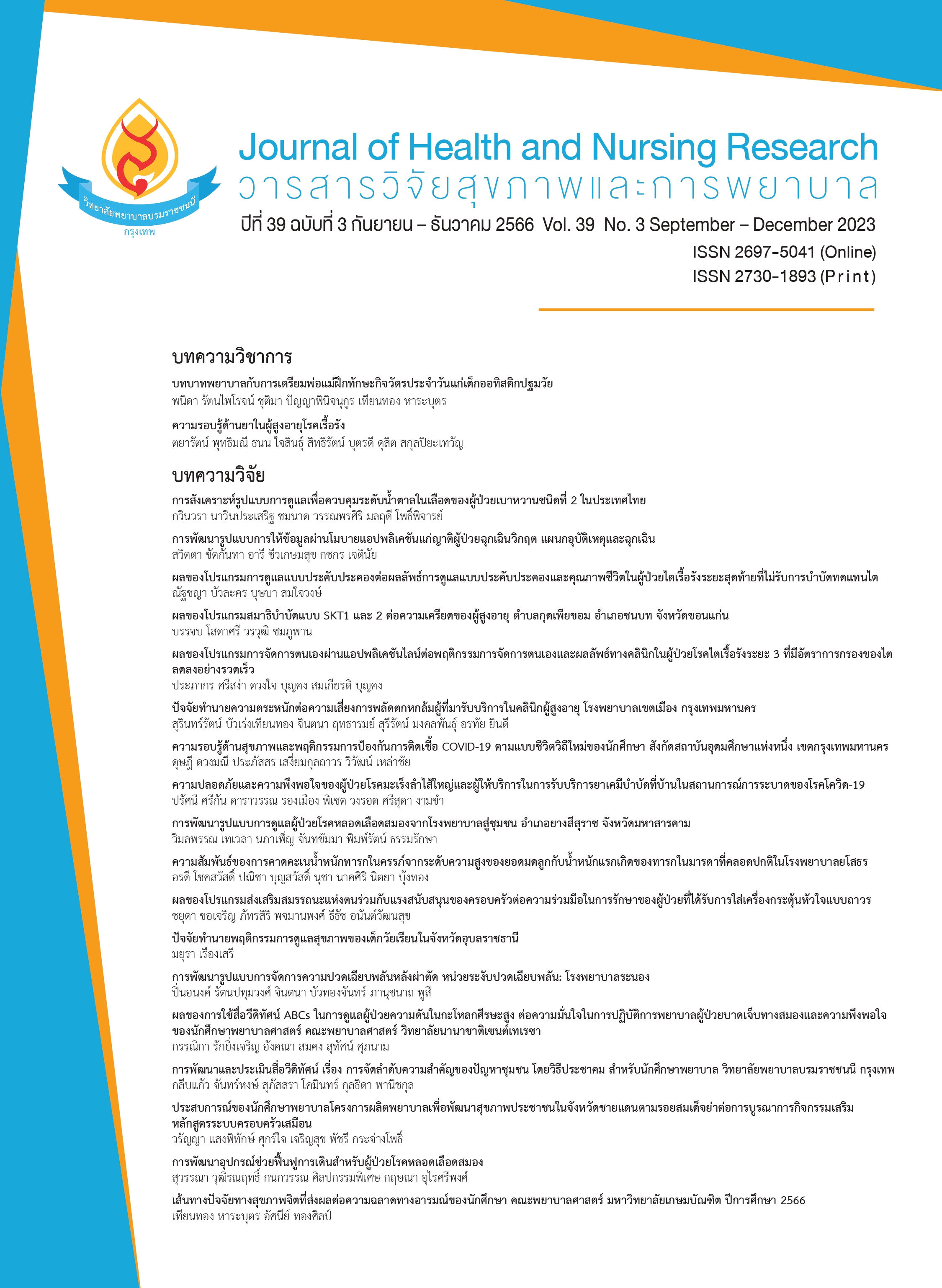ผลของโปรแกรมการดูแลแบบประคับประคองต่อผลลัพธ์การดูแลแบบประคับประคอง และคุณภาพชีวิตในผู้ป่วยไตเรื้อรังระยะสุดท้ายที่ไม่รับการบำบัดทดแทนไต
คำสำคัญ:
การดูแลแบบประคับประคอง , คุณภาพชีวิต , โรคไตเรื้อรังระยะสุดท้ายบทคัดย่อ
บทนำ: การดูแลแบบประคับประคองเป็นทางเลือกหนึ่งของการรักษาโรคไตเรื้อรังระยะสุดท้าย โดยการดูแลแบบประคับประคองจะให้ความสำคัญกับการดูแลผู้ป่วยอย่างเป็นองค์รวมที่ครอบคลุม สนับสนุนด้านจิตสังคมและจิตวิญญาณ เพื่อการชะลอความเสื่อมของไตและลดการเกิดภาวะแทรกซ้อน
วัตถุประสงค์: ศึกษาผลของโปรแกรมการดูแลแบบประคับประคองต่อผลลัพธ์การดูแลแบบประคับประคอง และคุณภาพชีวิตในผู้ป่วยไตเรื้อรังระยะสุดท้ายที่ไม่รับการบำบัดทดแทนไต
ระเบียบวิธีวิจัย: เป็นการวิจัยกึ่งทดลองแบบกลุ่มเดียววัดก่อนและหลังการทดลองในผู้ป่วยโรคไตเรื้อรังระยะสุดท้ายที่ไม่รับการบำบัดทดแทนไต จำนวน 22 ราย โดยกลุ่มตัวอย่างจะได้รับการดูแลตามโปรแกรมการดูแลแบบประคับประคองที่ผู้วิจัยได้พัฒนาขึ้น เครื่องมือที่ใช้ในการวิจัยประกอบด้วย แบบประเมินผลลัพธ์การดูแลผู้ป่วยแบบประคับประคองฉบับใช้ถามผู้ป่วย และแบบสอบถามคุณภาพชีวิตเฉพาะโรคไตเรื้อรัง การตรวจสอบคุณภาพของเครื่องมือ ได้ค่าสัมประสิทธิ์ครอนบาคแอลฟ่า เท่ากับ .96 และ .95 ตามลำดับ ส่วนโปรแกรมฯที่ใช้ดำเนินการทดลอง ตรวจสอบดัชนีความตรงตามเนื้อหาได้เท่ากับ 1 วิเคราะห์ข้อมูลโดยใช้สถิติเชิงบรรยาย และ Wilcoxon sign rank test
ผลการวิจัย: ภายหลังเข้าร่วมโปรแกรมฯ กลุ่มตัวอย่างมีค่าเฉลี่ยคะแนนผลลัพธ์การดูแลแบบประคับประคอง ลดลงกว่าก่อนเข้าโปรแกรมฯ อย่างมีนัยสำคัญทางสถิติ (Z = -3.498 p < .05) และคุณภาพชีวิตโดยรวมเพิ่มขึ้นกว่าก่อนเข้าโปรแกรมฯ อย่างมีนัยสำคัญทางสถิติ (Z = -3.099 p < .05)
สรุปผล: ผลของโปรแกรมการดูแลแบบประคับประคองสามารถเพิ่มคุณภาพการดูแลและเพิ่มคุณภาพชีวิต ในผู้ป่วยไตเรื้อรังระยะสุดท้ายได้
ข้อเสนอแนะ: ควรนำโปรแกรมฯ มาประยุกต์ใช้ในการดูแลผู้ป่วยโรคไตเรื้อรังระยะสุดท้ายที่ไม่รับการบำบัดทดแทนไตและควรศึกษาคุณภาพชีวิตต่อเนื่องในระยะยาว
Downloads
เอกสารอ้างอิง
Saran R, Robinson B, Abbott KC, Agodoa LYC, Albertus P, Ayanian J, et al. US Renal Data System 2016 annual data report: epidemiology of kidney disease in the United States. American journal of kidney diseases 2017;69(3 Suppl 1):A7–8. doi: 10.1053/j.ajkd.2016.12.004.
Chuasuwan A, Lumpaopong A, editors. Thailand renal replacement therapy year 2020. Bangkok: Nephrology Society of Thailand; [n.d.]. (in Thai)
Kietrsunthorn K, editor. Clinical practice recommendation for comprehensive conservative care in chronic kidney disease 2017. Bangkok: Nephrology Society of Thailand; 2018. (in Thai)
Nephrology Society of Thailand, Karunruk Palliative Care Center. Srinagarind Hospital. Khon Kaen University, Nephrology Nurses Association of Thailand, Ministry of Public Health, Thai Dietetic Association, Kidney Friends Association of Thailand. Kidney supportive and palliative cares 2023. Bangkok: Nephrology Society of Thailand; 2023. (in Thai)
Nephrology Society of Thailand. Hemodialysis and plasma filtration treatment guide for patients with kidney disease 2018. Bangkok: The Society; 2018. (in Thai)
Kimmel PL, Emont SL, Newmann JM, Danko H, Moss AH. ESRD patient quality of life: symptoms, spiritual beliefs, psychosocial factors, and ethnicity. American journal of kidney diseases 2003 ;42(4):713–21. doi: 10.1016/s0272-6386(03)00907-7.
Sapinan L. Palliative care Outcome Scale: POS. Chiang Mai: Maharaj Nakorn Chiang Mai Hospital; 2013. (in Thai)
Haraldstad K, Wahl A, Andenæs R, Andersen JR, Andersen MH, Beisland E, et al. A systematic review of quality of life research in medicine and health sciences. Quality of life research 2019;28(10):2641–50. doi: 10.1007/s11136-019-02214-9.
World Health Organization. Palliative care [Internet]. 2018 [cited 2021 Jul 17]. Available from: https://kku.world/qk7zr
Murtagh FEM, Burns A, Moranne O, Morton RL, Naicker S. Supportive care: comprehensive conservative care in end-stage kidney disease. Clinical journal of the American Society of Nephrology 2016;11(10):1909–14. doi: 10.2215/CJN.04840516.
Burns N, Grove SK. The practice of nursing research: conduct, critique, and utilization. 5th ed. St. Louis (MO): Elsevier/Saunders; 2005.
Suriyabantoeng Y, Nakawiro P. Quality of life in palliative end-stage renal disease patients in Phra Nakhon Si Ayutthaya Hospital. Journal of Preventive Medicine Association of Thailand 2020;10(1):49–60. (in Thai)
Institute of Geriatric Medicine. Mini-mental state examination: MMSE–Thai 2002. ฺฺBangkok: The Institute; 2002. (in Thai)
Charlson ME, Pompei P, Ales KL, MacKenzie CR. A new method of classifying prognostic comorbidity in longitudinal studies: development and validation. Journal of chronic diseases 1987;40(5):373–83. doi: 10.1016/0021-9681(87)90171-8.
Hearn J, Higginson IJ. Development and validation of a core outcome measure for palliative care: the palliative care outcome scale. Palliative Care Core Audit Project Advisory Group. Quality and Safety in Health Care. 1999;8(4):219–27. doi: 10.1136/qshc.8.4.219.
Anseekaew P, Matchim Y, Ratanabunjerdkul H. The effects of an end-of-life care program on the palliative care outcomes and perceived peaceful end of life among end-stage cancer patients. Journal of The Royal Thai Army Nurses 2020;21(2):315–23. (in Thai)
Homjean K, Sakthong P. Translation and cognitive testing of the Thai version of the kidney disease quality of life short-from questionnaires version 1.3. Thai Journal of Pharmacy Practice 2010;2(1):3–14. (in Thai)
Kasuya E. Wilcoxon signed-ranks test: symmetry should be confirmed before the test. Animal Behaviour 2010;3(79):765–7.
ดาวน์โหลด
เผยแพร่แล้ว
รูปแบบการอ้างอิง
ฉบับ
ประเภทบทความ
สัญญาอนุญาต
ลิขสิทธิ์ (c) 2023 วารสารวิจัยสุขภาพและการพยาบาล (วารสารวิทยาลัยพยาบาลบรมราชชนนี กรุงเทพ)

อนุญาตภายใต้เงื่อนไข Creative Commons Attribution-NonCommercial 4.0 International License.
บทความที่ได้รับการตีพิมพ์ เป็นลิขสิทธิ์ของวารสารวิจัยสุขภาพและการพยาบาล (วิทยาลัยพยาบาลบรมราชชนนี กรุงเทพ) ไม่สามารถนำไปตีพิมพ์ซ้ำในวารสารฉบับอื่น


















